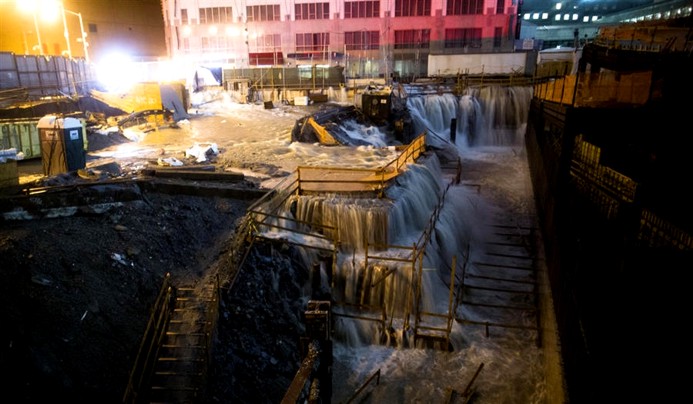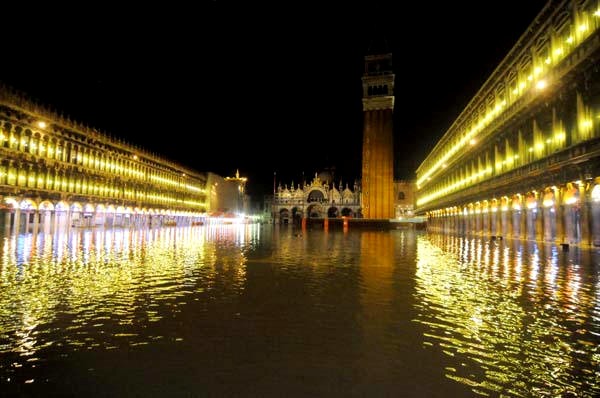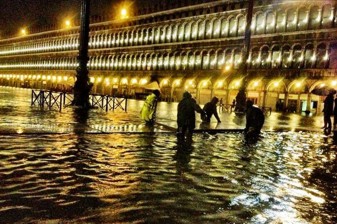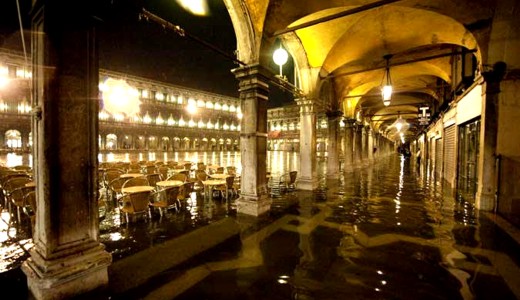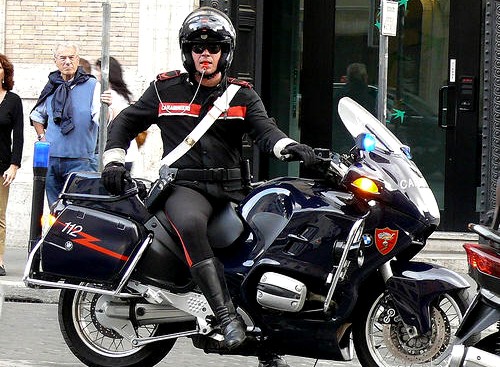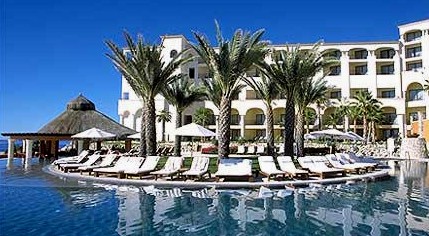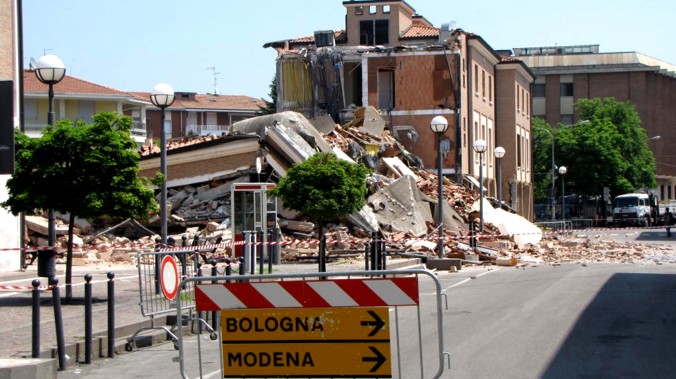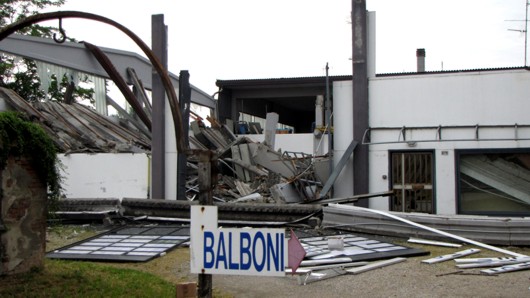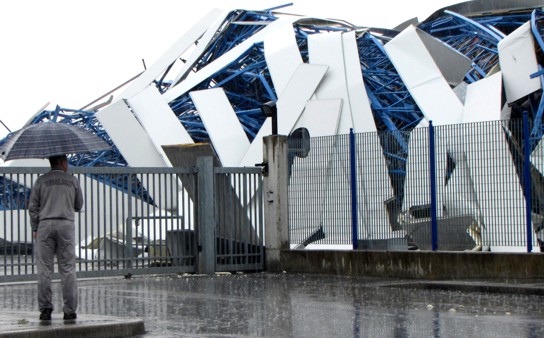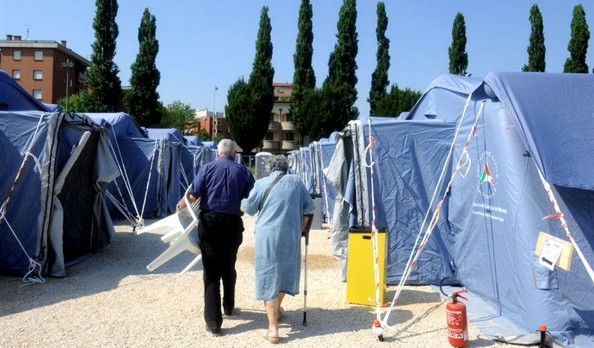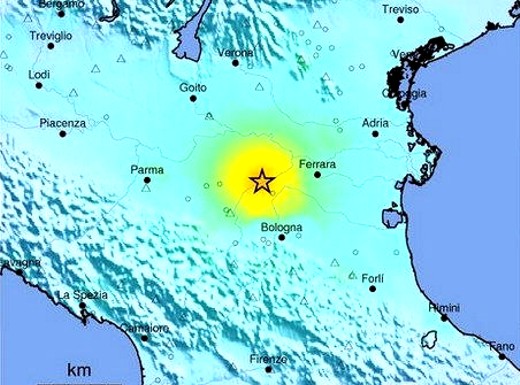
Category: Italian context
Monday, December 10, 2012
Italian News Through February Will Be Dominated By A Surprise Election
Posted by Peter Quennell
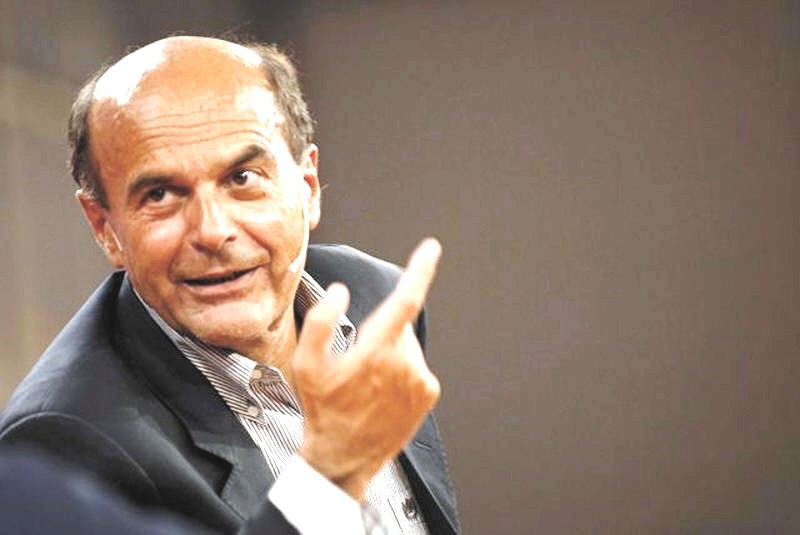
[Above: Pier Luigi Bersani, the probable next prime minister of Italy]
Prime Minister Monti is leaving, with most of his reforms pushed through, after Ex-PM Berlusconi’s party withdrew support.
Berlusconi announced he would again seek to be Prime Minister but his flouting of law, slimy ethics and previous wrecking of the economy don’t exactly make him the front-runner.
The front-runner in fact is Pier Luigi Bersani, the leader of the center-left Democratic Party, who has said he will sustain the reforms his party helped Mr Monti put in place.
Italy doesn’t usually have primary elections but the other day it did and Mr Bersani really trounced a leadership bid by the young mayor of Florence, Matteo Renzi (image below).
Mr. Bersani, 61, who has been the secretary of the Democratic Party since 2009, ran as the favorite, with nearly the full support of the party apparatus and its elected officials. He easily defeated Mr. Renzi, winning nearly 61 percent of the vote.
But Mr. Renzi’s message of change rang forcefully with a sizeable chunk of the center-left electorate, with over one million supporting him. He also attracted a considerable number of mostly young center-right voters whose frustrations with Italy’s influential and pervasive gerontocracy obliterated party lines.
It is a message that Mr. Bersani may have heeded. Speaking to supporters on Sunday night, he said his greatest challenges were to change the center-left and to “prepare paths and spaces to give opportunities to new generations.”
Austerity as a precursor to strong growth had already been taking a lot of knocks as the evidence that it is a cure-all is pretty slim and it creates terrible unemployment. Center-left governments (as in the US) are doing well these days.
The IMF was once the grand inquisitor of the austerity movement but is increasingly inclining toward the Asian mixed model, in part because it is there the IMFs cash and leadership increasingly come from.
This might be quite a help to Mr. Bersani as he confronts harder-line EU leadership and bond markets.
[Below: Matteo Renzi who lost primary but may affect Italy’s direction anyway]
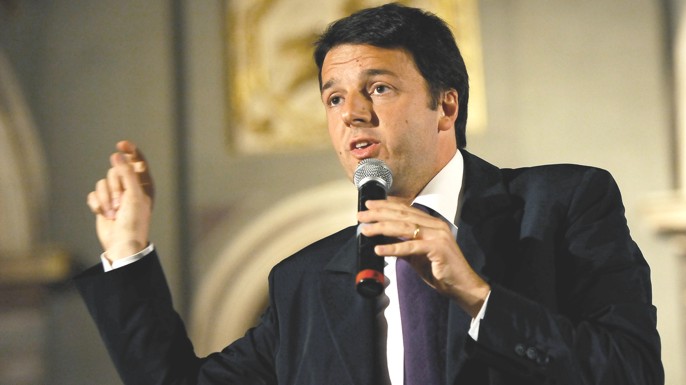
Wednesday, November 21, 2012
What New York And Venice (Surprise Surprise) Suddenly Find They Have In Common
Posted by Peter Quennell
1) New York
Plus more images down below in Comments.
2) Venice
Plus more images down below in Comments.
Thursday, October 18, 2012
The Sunk Ship: This Week’s Closed Hearings Required The Conversion Of This Theater
Posted by Peter Quennell

The international media presence at the hearings in Grosetto matches those at the end of the trial and the appeal in Perugia.
But despite the conversion into a court of the large Theater Moderno shown here, the media is not getting to observe the hearings first-hand. The judges decided that they all have to wait outside.
So many passengers and relatives of victims wanted to attend to look Captain Schettino in the eye that they occupy all of the several thousand seats.
This hearing is similar to the hearing presided over by Judge Micheli in October 2008 to decide whether to remand Knox and Sollecito for trial. We should know in a few days if Captain Schettino and several other officers and company officials will face trial for manslaughter and other crimes.
Perhaps the most shocking fact to emerge from the reports prepared for the hearings is that once the ship was gashed in the side it was almost instantly mechanically incapacitated. If a brisk headwind had not stopped the ship and pushed it around onto an underwater shelf, it might have sunk in minutes, perhaps with several thousand drowned.
The captain has just been fired. He in turn is strenuously trying to shift the blame for the disaster to his fellow crew, many of whom had weak English and no Italian, and also to the cruise company.
The cruise-line business has now recovered but, as with the Titanic, a lot is being learned around the world about ship construction, emergency ship management, and the relevant law.


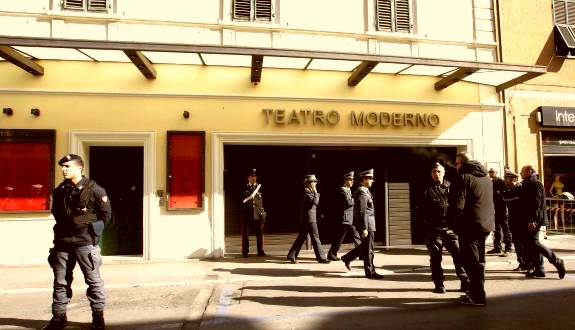

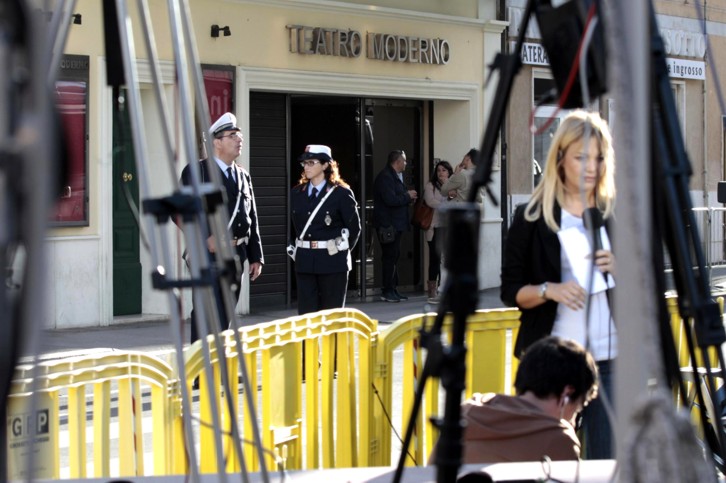
[Below: Captain Schettino, now fired by his company, arrives from Sorrento for the hearing]

[Below: Giulia Bongiorno reopresents some passenger and seeks a class action suit]
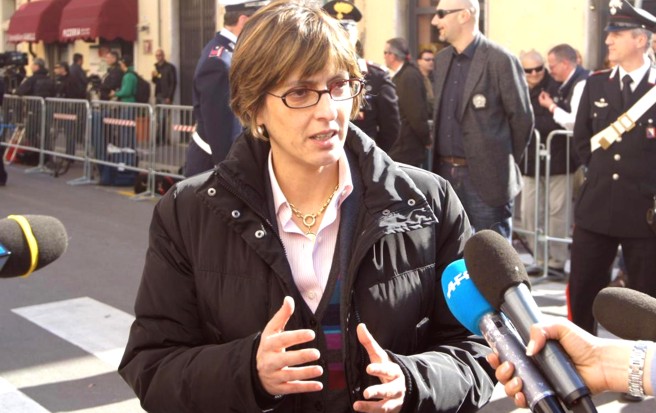
[Below: the ship now shows up on Google Earth. The rocks it hit are at lower left]
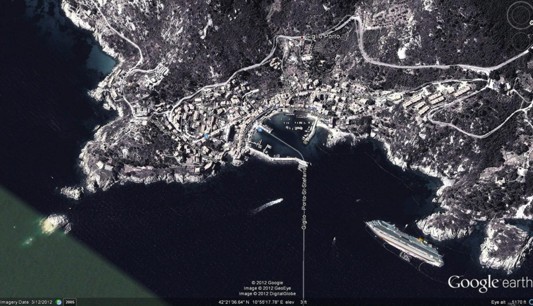
Thursday, August 30, 2012
Seems A Sudden U-Turn For The Better In The German-Italian Economic Relationship
Posted by Peter Quennell
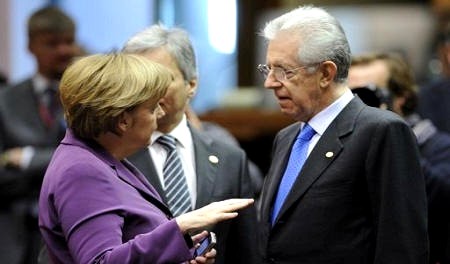
This has been a tense time for both leaders. Just a few days ago nasty words were surfacing in the media on both sides.
But quite suddenly things are looking up. Ms Merkel praises Mr Monti and Italy just got the best price for its bonds since March.
Still the deep insecurities persist. Hard to see such a fine people so down.
Tuesday, July 31, 2012
In Terms Of Medals Won Per Population Per Capita Italy Is Right Now Coming First At Olympics
Posted by Peter Quennell
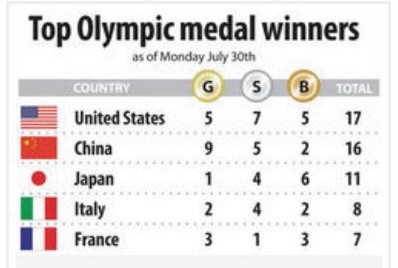
The two frontrunner countries - the US and China - have overall each won about twice Italy’s current tally of medals.
Japan also has won several more. However, Japan’s population is more than twice the size of Italy’s, the US’s population is more than 5 times, and China’s population is more than 15 times.
Some 27 countries have so far won medals, out of 204 countries competing.
Right now Italy is ahead of France, South Korea, Russia, North Korea, Australia, Britain (host country), Romania, Brazil, Hungary, Ukraine, Kazakhstan, Germany, and the Netherlands.
Rankings do change almost daily, but Italian athletes are off to a pretty nice start.
Tuesday, June 26, 2012
Italian Police Long Known As Among Europe’s Coolest, Now Also Being Remarked Upon As…
Posted by Peter Quennell
It’s tough right now for Italian cops, going up against the rioting crowds and the illegal immigrants and the three mafias. But with their sustained pressure the mafias are fading, and the riots and immigrants may dwindle soon if and when light appears at the end of the economic tunnel.
And those images are not what Italian police are best known for.
Above all else, they are cool. They officially work hard at being cool and high-profile and rather colorful, which is perhaps one reason why the Italian prison population is so very low. Their regular uniforms and their ceremonial uniforms tend to be eye-catching, and sometimes resplendent, and unless you’re Mr Berlusconi, their manner tends toward firm but agreeable, and sometimes quite funny. .
One can be doing 100 mph on an autostrada and a car will come by at 140 mph, with a police car on its tail which can exceed 200 mph. The second to last image below (above the… enough said) is of a Bugatti Veyron, which even in standard mode is powered by an engine of 1000 horsepower and has been clocked at close to 250 mph. (It also costs close to $2 million to private buyers.)
Now here is a report by John Hopper in the UK Guardian on the Italian police’s frequent warm side, and there are similar tales about the polizei on quite a few English-language and Italian blogs.
The financial crisis in Europe may have brought out the worst in certain bankers, but it seems to be bringing out the best in Italy’s police.
On Tuesday, and for the second time in less than a month, officers called to deal with a shoplifter were reported to have taken pity on the alleged thief and paid for the goods out of their own pockets.
The latest case arose when staff at a supermarket on the outskirts of Siena, in Tuscany, alerted police to a suspected robbery. The officers found a 27-year-old Egyptian and his 19-year-old brother who had apparently failed to pay for goods they had removed from the shop.
The police established that the older of the two was unemployed and had a wife and two children. Along with some pasta, he and his brother were found to have taken only milk, nappies and baby food. At this point, according to Corriere Fiorentino, the officers opened their wallets and paid the bill.
A similar gesture prompted a round of applause from shoppers at a supermarket in Milan after a 76-year-old pensioner, identified only as Angela, was found to have passed through the checkout without paying for a box of Tic Tac sweets worth 60p.
Sergeant Arturo Scungio said he and his patrol partner had caught up with the suspect near the shop. “She was trembling like a leaf and was clearly frightened by the uniform. From the way she was dressed, I realised she was not well off, that she was one of those who have difficulty making it to the end of the month. I told her what the law was and then I asked her how much pension she received.”
The old lady said that she was on €320 (£255) a month, adding: “I’ve always paid my taxes.” Scungio said that by the time they returned to the supermarket checkout, she was in tears.
The manager told them he did not intend to press charges. “I opened my wallet and paid the 78 cents owed for the Tic Tacs,” Scungio said.
Those humorless sad sacks who have attached themselves to Amanda Knox like leeches… Pity they’re so blinded to Italy’s rather cool reality.
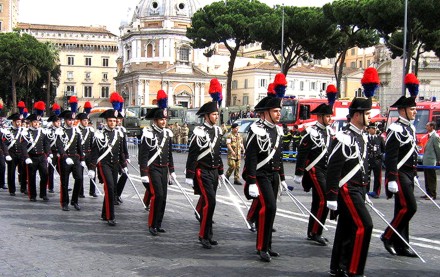

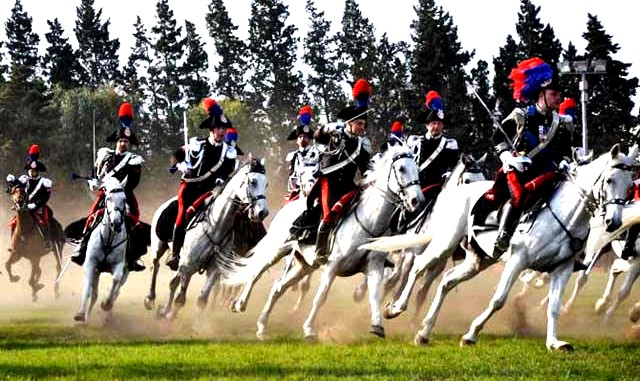

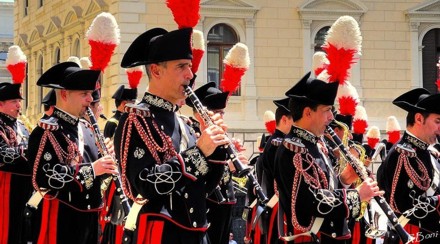

Wednesday, June 20, 2012
With Italy Pushing, There Are Increasing Bets On Europe Settling On A Growth Plan B
Posted by Peter Quennell
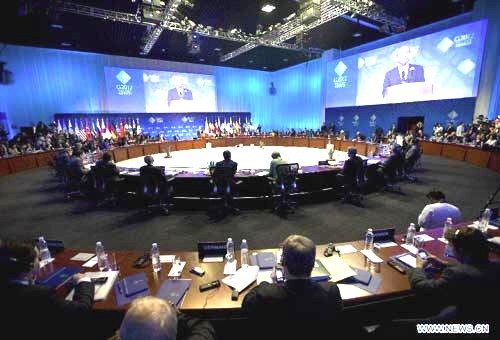
[Above and below: the G20 meeting in Baja California and the Los Cabos resort]
At the G20 Summit now taking place on the Baja Peninsula Italy and France have just strongly pushed for the creation of Euro-bonds.
The rates for such bonds to be secured mostly by gold (mostly on deposit in the Federal Reserve Bank in New York - where a lot of Europe’s troubles began!) would reflect investors’ perceptions of the growth potential of all of Europe, not just Greece or Spain or Italy or Portugal or Ireland by themselves.
A cheaper cost of capital across Europe would help to make the value equations start to come right. Far better than Germany’s imposed Plan A which is essentially austerity during a recession and nothing else.
In contrast the German economy is actually doing very nicely right now, with high growth and low unemployment and strong exports and huge swathes of capital moving into its rather strapped banks from the countries further south. Other things being equal, Germany could live with a “half pregnant” situation for quite a while.
But thankfully, there are two dark clouds on Germany’s horizon which may cause it to end its power trip.
First, Greece and Spain and Italy could all vote in radical-left governments within a year if austerity remains the entire mix. And second, the entire world could move into recession or even depression and then Germany would slow down along with everybody else.
Germany could do everyone a lot of good if it stopped the moralising and instead shared with all the other countries how its own extended growth came about.
It is worth reading the Wikipedia entry for Germany’s history of growth. Two post WWII concepts made a huge difference and still do. Here they are in bold.
The Germans proudly label their economy a “soziale Marktwirtschaft,” or “social market economy,” to show that the system as it has developed after World War II has both a material and a social””or human””dimension. They stress the importance of the term “market” because after the Nazi experience they wanted an economy free of state intervention and domination. The only state role in the new West German economy was to protect the competitive environment from monopolistic or oligopolistic tendencies””including its own.
The term “social” is stressed because West Germans wanted an economy that would not only help the wealthy but also care for the workers and others who might not prove able to cope with the strenuous competitive demands of a market economy. The term “social” was chosen rather than “socialist” to distinguish their system from those in which the state claimed the right to direct the economy or to intervene in it.
Beyond these principles of the social market economy, but linked to it, comes a more traditional German concept, that of Ordnung, which can be directly translated to mean order but which really means an economy, society, and policy that are structured but not dictatorial. The founders of the social market economy insisted that Denken in Ordnungen””to think in terms of systems of order””was essential. They also spoke of Ordo-Liberalismus because the essence of the concept is that this must be a freely chosen order, not a command order.
This is in many ways the opposite of the tunnel-vision Washington Consensus which the IMF and World Bank and United States for far too long wrongly imposed on the world - and of which Euro-austerity is its devil spawn.
You can find a similar philosophy to Germany’s in Japan with the Keiretsu which saw it rocket up in the 60s and 70s, and which was picked up by the Little Dragons and China and finally all the middle-tier economies seeing recent strong growth.
Europe needs to further shore up and educate its manpower. That is a no-brainer. But its major growth breakout will only come if it tweaks and reinvents its millions of technical and managerial systems, just as Germany does. And if it demonstrates a very sharp nose for future value - as in fact Italy’s nimble entreprenuers already do.
It’s smart systems to create high value that you need, guys. Don’t let the over-intrusive and not-very-enlightened economists and central bankers and politicians tell you different.
Wednesday, June 13, 2012
Today And Tomorrow Are Really Key Days For The Italian Economy If Future Sums Are To Work
Posted by Peter Quennell
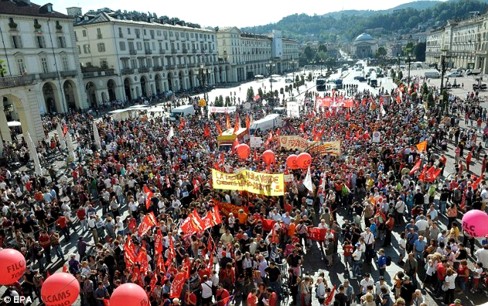
[Above: a demonstration against austerity, in Turin, one of several hundred in recent days]
The Italy central bank is selling a lot of bonds today and tomorrow to keep the government in business.
Today’s sale of 12-month bonds did not go well. It sold E6.5 billion of bonds at nearly 4 percent, almost double what it was charged just last month. And tomorrow’s sale of long-term bonds could be looking at interest rates so high that it puts real growth almost permanently out of reach.
In effect it could bake in youth unemployment up to 25 percent. The good news, if there is any, is that the disappointing sale today gave Prime Minister Monti a reason to light a fire under the parliament.
talian Premier Mario Monti is urging lawmakers to accelerate passage of reforms to help the country escape the deepening debt crisis and assure international markets that the eurozone’s third largest economy will follow words with actions.
Monti addressed the lower house before a vote on anti-corruption measures, and the morning after meeting leaders of three main political forces to urge them to intensify the reform course.
Spain’s decision over the weekend to seek a bailout for its banks has heightened pressure on Italy. The Austrian finance minister suggested this week that Italy too will need a bailout, then backtracked under criticism.
Monti has firmly denied that Italy will need a bailout, and told lawmakers that Italy is on much better footing than a few months ago.
One thing going for Italy is that those bonds are largely purchased by Italians themselves. Savings have been flying out of Greece and Spain but Italians still seem optimistic at some level that their economy can get back to former heights
Mr Monti’s pruning and tightening of laws don’t seem a bad thing. His main growth-thrust idea for all of Europe, Italy included, is to press the pedal to the floor on rebuilding all the physical infrastructure. Angela Merkel might come around if that doesnt tank Germany’s own boom.
The notion that there should be a sort of skeleton Department of the Treasury or Ministry of Finance in Brussels to harmonize fiscal policies and oversee the banks seems to be taking hold.
Still only dim comprehension (as in the US) though of how the best kind of growth really works. Hint: economists and bankers are not the first professions one turns to, to find out all about that.
Saturday, June 02, 2012
Andrea Vogt Reports First-Hand On The Earthquakes That Have Hit Italy’s Economic Epicenter
Posted by Peter Quennell
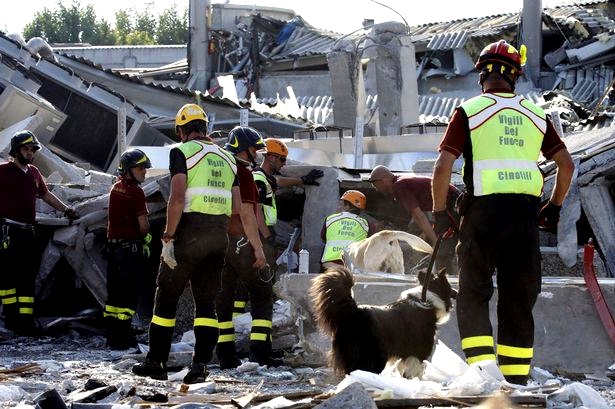
[Images here are by Andrea Vogt and one each Getty Images and NBC.]
Italy’s previous large earthquake in 2009 resulted in 308 deaths around L’Aquila.
A lot of the extensive damage to that town occurred because L’Aquila is an old city (one hour south-east of Perugia) which had not yet been braced or modernised to withstand severe earthquakes.
The two quakes that hit the province of Modena (map at bottom) in the past two weeks resulted in less than two dozen deaths, but in all other respects their damage has been far greater. They were more severe on the Richter scale than the L’Aquila earthquake and tremors were felt all over northern Italy and up into Austria.
And they struck right in Italy’s economic-exports heartland.
Car-makes Maserati, Ferrari and Lamborghini and the mortorcycle maker Ducati are all based right there and all of their plants temporarily had to shut down. Maserati and Ferrari are now owned by FIAT (majority owner of the US’s Dodge-Chrysler) which also saw other assembly plants hit.
Modena also produces cheeses which are heavily exported, and not far away are the plants of the exporters of textile, leather and jewelery fashion goods, of ceramics, of foods other than cheeses, and of Italian wines.
On-the-spot reports by Andrea Vogt with more close-up human detail than most others have appeared on a number of media websites. Excerpts from the report Andrea Vogt filed with Tom Kington which appeared on the Guardian website:
The Italian government said 8,000 people were left homeless, adding to the 6,000 already sleeping in tents and temporary accommodation after the first, 6.0-magnitude quake, which struck the same area in the early hours and killed seven.
The latest quake occurred at 9am when more factories were open ““ causing the higher death toll…. Some of the victims died in factories that had just reopened after suffering damage in the earlier quake.
“I saw dust and smoke coming up from the factories and warehouses on the edge of town,” said Cavezzo resident Maurizio Bruschi. “Many told themselves that the worst was over. But we keep getting hammered.”,,,
The quakes are a serious blow for one of Italy’s most productive regions, just as the country struggles to lift itself out of recession. “Fear will paralyse Emilia now,” wrote Mario Calabresi, editor of the newspaper La Stampa. “Who’s going to be willing to go back to work in a big warehouse now?” he asked…
Convoys of fire brigades and ambulances clogged tiny roads east of Modena, many littered with downed electrical lines and fallen debris. In the tent cities instructions were written in Italian and Arabic for the benefit of migrants working in local factories.
Other residents set up tents in their gardens, or made plans to head to relatives or to the Adriatic coast, where some hotels were opening up rooms to evacuees.”
More below.
From the same report, a story of a priest who was one of those killed by the unexpected double whammy.
In Rovereto sul Secchia a priest, Father Ivan Martini, was killed by a falling beam when his church partially collapsed on him. He was visiting the church, which had been damaged in the earlier quake, to see if he could salvage a statue of the Madonna.
“He was brilliant, and very dedicated, especially to the inmates incarcerated in Modena, where he was the prison chaplain,” said fellow priest Father Carlo Truzzi.
Andrea Vogt also posted a more detailed day-by-day report on her blog the Freelance Desk after combing the stricken areas. Her description below is what happened to the collapsed ceramics plant you can see in the first image below. .
Just a few hundred meters away, workers and curious onlookers came to see what was left of the twisted blue steel of the Sant’ Agostino Ceramics plant. They stared, the silence broken only by the eery sound of ceramic tiles clanking down from high scaffolding into the knot of bent metal. Two workers, Nicola Cavicchi, 35, and Leonardo Ansaloni, 51, died under the rubble as they tried to escape.
When Italy looses, we all really loose. Tough time to now have to pay for re-building.
Tuesday, May 29, 2012
A Second Earthquake Hits Italy One Week Later With Reported 17 Dead
Posted by Peter Quennell


